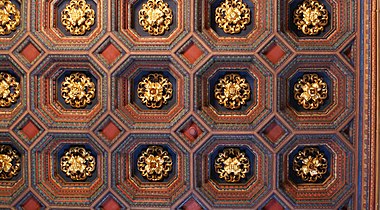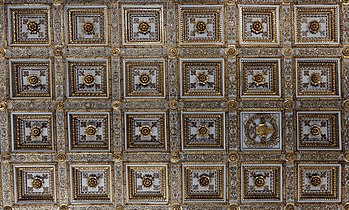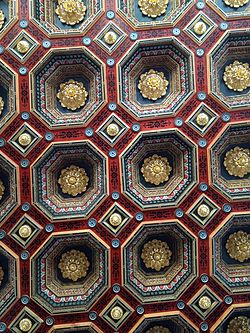Coffer
Topic: Engineering
 From HandWiki - Reading time: 4 min
From HandWiki - Reading time: 4 min
A coffer (or coffering) in architecture is a series of sunken panels in the shape of a square, rectangle, or octagon in a ceiling, soffit or vault.[1] A series of these sunken panels was often used as decoration for a ceiling or a vault, also called caissons ("boxes"), or lacunaria ("spaces, openings"),[2] so that a coffered ceiling can be called a lacunar ceiling: the strength of the structure is in the framework of the coffers.
History
The stone coffers of the ancient Greeks[3] and Romans[4] are the earliest surviving examples, but a seventh-century BC Etruscan chamber tomb in the necropolis of San Giuliano, which is cut in soft tufa-like stone reproduces a ceiling with beams and cross-beams lying on them, with flat panels filling the lacunae.[5] Coffering is known as zaojing (Chinese: 藻井; pinyin: zǎojǐng) in ancient Chinese wooden architecture.[6]
It was thought for centuries that wooden coffers were first made by crossing the wooden beams of a ceiling in the Loire Valley châteaux of the early Renaissance.[7] However, archaeologists working at the House of the Telephus in Herculaneum in 2012 discovered that wooden coffered ceilings were constructed in Roman times.[8] A prominent example of Roman coffering, employed to lighten the weight of the dome, can be found in the ceiling of the rotunda dome in the Pantheon, Rome.[citation needed]
Experimentation with the possible shapes in coffering, which solve problems of mathematical tiling, or tessellation, were a feature of Islamic as well as Renaissance architecture. The more complicated problems of diminishing the scale of the individual coffers were presented by the requirements of curved surfaces of vaults and domes.[citation needed] Coffered ceilings were used in cathedrals starting with St Mark's Basilica and Santa Maria Maggiore. They spread following the reforms of the Council of Trent, as the improved acoustics and opportunity to include statues, apostolic heraldry[9] and other religious elements in compositions with versatile shapes was thought to enhance the doctrinal purpose of a cathedral.[10]
Gallery
-
Coffered plafond at Wawel Castle, Kraków, Poland
-
Coffered ceiling of the Sala dell'Udienza, in the Palazzo Vecchio in Florence
-
Chapelle Expiatoire, Paris
-
Giuliano da Sangallo's flat caisson ceiling from Basilica di Santa Maria Maggiore, Rome
-
Coffered ceilings of Mir Castle, Belarus
-
Chancel ceiling, Church of the Good Shepherd (Rosemont, Pennsylvania)
-
Coffered ceiling, Stock Exchange Pallace, Zagreb
-
Coffered ceiling typical of stations on the Washington Metro (Washington, DC)
See also
- Dome
- Dropped ceiling
- Cove ceiling
- Beam ceiling
- Muqarnas
Footnotes
- ↑ Ching, Francis D.K. (1995). A Visual Dictionary of Architecture. New York: John Wiley & Sons, Inc.. p. 30. ISBN 0-471-28451-3.
- ↑ An alternative, in a description of Domitian's audience hall by Statius, noted by Ulrich 2007:156, is laquearia, not a copyist's error, as it appears in Manilius' Astronomica (1.533, quoted by Ulrich).
- ↑ An example is the main hieron at Samothrace, where stone ceiling beams of the pronaos carried a coffered ceiling of marble slabs across a span of about 6.15 m (J.J. Coulton, Ancient Greek Architects at Work: Problems of Structure and Design; Cornell University Press) 1982:147; ISBN 978-0801492341)
- ↑ Roman wooden coffered ceilings are discussed in Roger Bradley Ulrich, Roman Woodworking, ch. "Roofing and ceilings" (Yale University Press) 2007.
- ↑ Illustrated in Ulrich, fig 8.27.
- ↑ Ching, Francis D.K. (2007). A Global History of Architecture. New York: John Wiley and Sons. p. 787. ISBN 978-0-471-26892-5. https://archive.org/details/globalhistoryofa0000chin.
- ↑ "coffer". Encyclopædia Britannica Online. http://www.britannica.com/eb/article-9024646/coffer.
- ↑ Hooper, John (2012-07-23). "House of the Telephus Relief: raising the roof on Roman real estate". The Guardian. https://www.theguardian.com/science/2012/jul/23/house-telephus-relief-roman. "Buried by Vesuvius nearly 2,000 years ago, archaeologists at Herculaneum have excavated and carried out the first-ever full reconstruction of the timber roof of a Roman villa"
- ↑ Freiberg, Jack (January 2019). "The Heraldic Ceilings of the Lateran Basilica" (in en). Di Sotto in Su: Soffiti nel Rinascimento a Roma. Rome, Palombi editore. pp. 39–60.
- ↑ Tosini, Arianna (2022). "Coffered ceilings in the churches of Rome, from the 15th to the 20th century". Technologies Engineering Materials Architecture 8 (1): 110. doi:10.30682/tema08SIi. https://rivistatema.com/sito/wp-content/uploads/2022/07/d-2-085-TEMA-Vol8-SI-TOSINI.pdf.
External links
 |
 KSF
KSF







